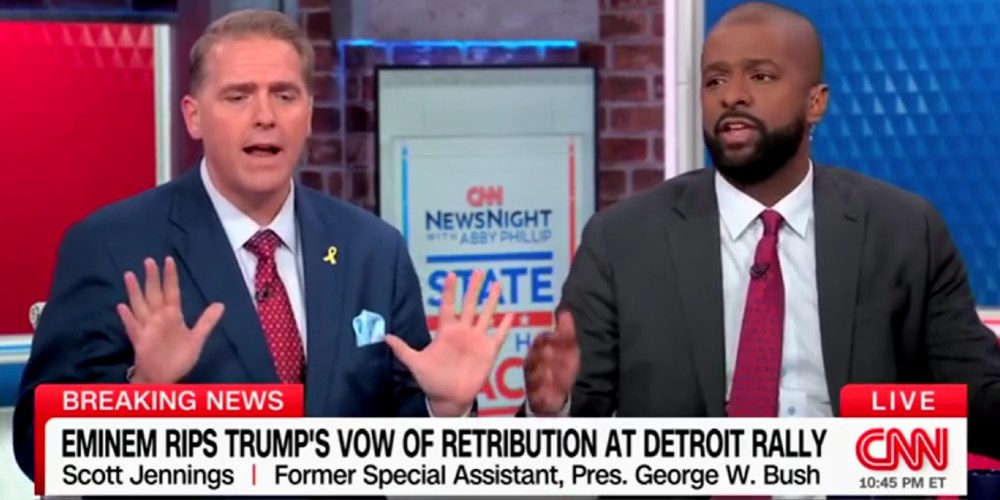
(DCNF)—A CNN panel got into a heated debate Tuesday as the network’s senior political commentator Scott Jennings brought up second gentleman Doug Emhoff’s alleged mistreatment of women.
The panel discussed rapper Eminem’s harsh criticisms of Republican nominee Donald Trump’s during a rally in Detroit, Michigan, alongside former President Barack Obama. Jennings said that Eminem has said derogatory words about women and even allegedly promoted domestic violence, but yet the public continues to chastise Trump for his alleged treatment of women.
“I think this Eminem thing, I got to tell you. So everything that’s said about Donald Trump and his treatment of women and the gender gap in this campaign. This rapper, who I fully admit has sold a lot of records, if you’ve read some of the things he has said about the promotion of domestic violence against women,” Jennings said, leading commentator Bakari Sellers to interrupt. “No, no, Bakari, I listened to your entire filibuster, if you could just give me 13 seconds.”
Jennings then pointed to the allegations against Emhoff, who has been accused of slapping his ex-girlfriend, making “misogynistic” and “sexist” remarks to his former female staffers and of impregnating his nanny while married to his first wife, Kirsten. Sellers then interrupted Jennings to call his statements “B.S.,” while CNN host Abby Phillips falsely said Trump had been found liable of rape.
“So when you think about the things [Eminem] has said in order to sell those records, and you also consider some of the questions that are swirling around Harris’ own husband in this regard,” Jennings said, before being interrupted once again.
WATCH:
“Oh my god,” Sellers said. “Okay, you don’t even get 12 seconds. I’m not gonna let you go into the far end of B.S.”
“We’re gonna stop here for a second,” Phillips said. “Alright, but Scott, I just have to say, I’ll take those concerns seriously if you also express concerns about the allegations [against Trump]. He’s been found liable of rape, Donald Trump has. So that’s also true, so we’re not going to litigate those other things, but you can’t just pick and choose.”
Phillips referred to the case against Trump brought forth by former Elle Magazine columnist E. Jean Carroll in 2023, who alleged that the former president raped her in 1995 or 1996 in a dressing room at Manhattan’s Bergdorf Goodman department store. The jury in the case found Trump not liable of rape, but liable of defamation and sexual assault.
Emhoff admitted to having an affair with his children’s nanny while still married to Kirsten Emhoff, prompting his then-wife to end their 16-year marriage when she learned about the infidelity in 2009, according to the Daily Mail.
The second gentleman’s former colleagues alleged that he would make “inappropriate” and “misogynistic” remarks toward the women staffers at Venable’s Los Angeles Office, a law firm that he managed from 2006 to 2017, according to the Daily Mail. He allegedly would be flirty with the “young, pretty girls” and shout expletives at his staff.
Emhoff has also been accused of slapping his ex-girlfriend during an alcohol-fueled fight over whether she had flirted with another guy after a Foundation for AIDS Research (amfAR) charity event.
The second gentleman said all of these allegations coming to light are “all a distraction” by his political opponents during an Oct. 11 interview with MSNBC’s Joe Scarborough.



